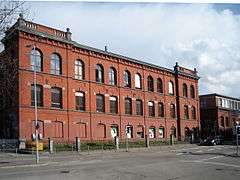Sequin and Knobel
Sequin and Knobel, or Séquin and Knobel, were a Swiss firm of architects notable for the design of industrial building such as cotton mills and weaving sheds. It was formed in 1895. The partners were Carl Arnold Séquin and Hilarius Knobel. Together they were responsible for over 250 industrial buildings.
Partners
Carl Arnold Séquin-Bronner (born 25 January 1845 in Uznach; died 25 November 1899 in Rüti ZH).[1]
Hilarius Knobel (born 1854 Glarus; died 1921 Zürich) was the son of the architect, Hilarius Knobel (born 4 February 1830 in Schwändi; died 25 February 1891 in Zürich) who was practising in Zürich in 1859.
Buildings

Rote Fabrik, built in 1892
- Mechanische Baumwollspinnerei und Weberei Augsburg (TIM) In 1895/98 they extended the existing factory, by the Proviantbach in Augsburg, adding a weaving shed for 640 automatic looms and a four storey spinning mill containing 42 000 spindles.
- Die Rote Fabrik am Zürichsee (Zürich-Wollishofen)
- Kammgarn Fabriksgebäude Spinnereistraße 10 in Hard, Vorarlberg [lower-alpha 1]
Footnotes
- Fabriksgebäude, Austrian Denkmal ObjektID: 22712, Spinnereistraße 10, Hard, Vorarlberg, Austria: Vorarlberger Kammgarnspinnerei, Fabriksgebäude built from a plan drawn up by C. Sequin, 1896, extended in 1909 by Josef Schöch; single storey steel framed pinning mill.
gollark: What?
gollark: New challenge idea: Initiate protocol 5.
gollark: ++procedure-5
gollark: Heresy.
gollark: Massive thonk spam is more for <#457999277311131649>.
References
- Hanak, Michael. "Séquin, Carl Arnold". Historisches Lexikon der Schweiz (in German). Retrieved 11 May 2015.
External links
| Wikimedia Commons has media related to Carl-Arnold Séquin-Bronner. |
| Wikimedia Commons has media related to Hilarius Knobel. |
This article is issued from Wikipedia. The text is licensed under Creative Commons - Attribution - Sharealike. Additional terms may apply for the media files.